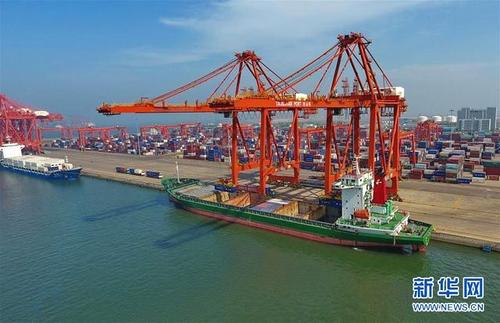


(Photo/Xinhua)
China’s recent decision to launch a new round of reduction in import tariffs signals major benefits for its trading partners and demonstrates the country’s sincerity in further opening up.
China will adjust import tariffs on a wide range of products starting Jan. 1, 2020, according to a recent circular released by the Customs Tariff Commission of the State Council.
The country will implement provisional import tax rates that are lower than the most-favored-nation (MFN) tariff rates for more than 850 products, suggested the circular.
The new adjustments to the import tariffs will involve significant tariff cuts and cover a wide range of commodities. For instance, the MFN tariff rate of fertilized fish eggs is currently 12 percent, and China’s provisional tariff rate is 0 percent. Furthermore, the country has decided to cut the tax rate of aircraft autopilot parts from 5 percent to 1 percent.
It’s expected that many foreign products, including frozen avocado from Kenya, frozen pork from the U.S., high-pressure control valves from Italy, and ferroniobium from Brazil, will receive more Chinese orders after the implementation of the new tax rates.
China’s rapid development promotes industrialization, informatization, urbanization, and agricultural modernization, and has generated huge demand for imports, thus creating enormous opportunities for employment.
According to a report on China’s economic and trade relations with the Latin American region and the Caribbean released by International Labour Organization (ILO), China had created as many as 1.8 million jobs for Latin America and the Caribbean from 1990 to 2016.
In 2020, China will further reduce tariffs on imports according to the free trade agreements it has separately signed with New Zealand, Peru, Costa Rica, Switzerland, Iceland, Singapore, Australia, the Republic of Korea, Georgia, Chile and Pakistan, as well as the Asia-Pacific Trade Agreement.
China will carry out the fifth reduction in MFN tariff rates for 176 information technology products from July 1, 2020, according to the Customs Tariff Commission.
Reducing importation costs can help further enrich domestic supplies to better serve people’s growing needs for personalized, diversified, and high-quality products.
China’s move to cut import tariffs is in line with its continuous efforts to promote opening-up over these years. Early in 2010, the country has fulfilled its commitment to reduce import duties, which it pledged to the WTO when joining the organization. By March 2018, China had implemented zero percent tariffs on 97 percent of the products from 36 developing countries which had established diplomatic ties and with China.
Since 2002, China’s average annual contribution to global economic growth has stood at nearly 30 percent, serving as an important driver of the recovery and growth of world economy.
In the face of mounting uncertainties in the global economic environment, China has once again rolled out practical measures to help open its door wider to the world and inject positive energy into the development of the global economy.
 Fire brigade in Shanghai holds group wedding
Fire brigade in Shanghai holds group wedding Tourists enjoy ice sculptures in Datan Town, north China
Tourists enjoy ice sculptures in Datan Town, north China Sunset scenery of Dayan Pagoda in Xi'an
Sunset scenery of Dayan Pagoda in Xi'an Tourists have fun at scenic spot in Nanlong Town, NW China
Tourists have fun at scenic spot in Nanlong Town, NW China Harbin attracts tourists by making best use of ice in winter
Harbin attracts tourists by making best use of ice in winter In pics: FIS Alpine Ski Women's World Cup Slalom
In pics: FIS Alpine Ski Women's World Cup Slalom Black-necked cranes rest at reservoir in Lhunzhub County, Lhasa
Black-necked cranes rest at reservoir in Lhunzhub County, Lhasa China's FAST telescope will be available to foreign scientists in April
China's FAST telescope will be available to foreign scientists in April "She power" plays indispensable role in poverty alleviation
"She power" plays indispensable role in poverty alleviation Top 10 world news events of People's Daily in 2020
Top 10 world news events of People's Daily in 2020 Top 10 China news events of People's Daily in 2020
Top 10 China news events of People's Daily in 2020 Top 10 media buzzwords of 2020
Top 10 media buzzwords of 2020 Year-ender:10 major tourism stories of 2020
Year-ender:10 major tourism stories of 2020 No interference in Venezuelan issues
No interference in Venezuelan issues
 Biz prepares for trade spat
Biz prepares for trade spat
 Broadcasting Continent
Broadcasting Continent Australia wins Chinese CEOs as US loses
Australia wins Chinese CEOs as US loses